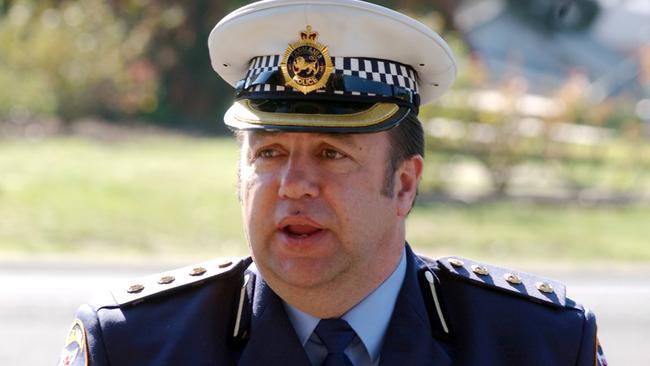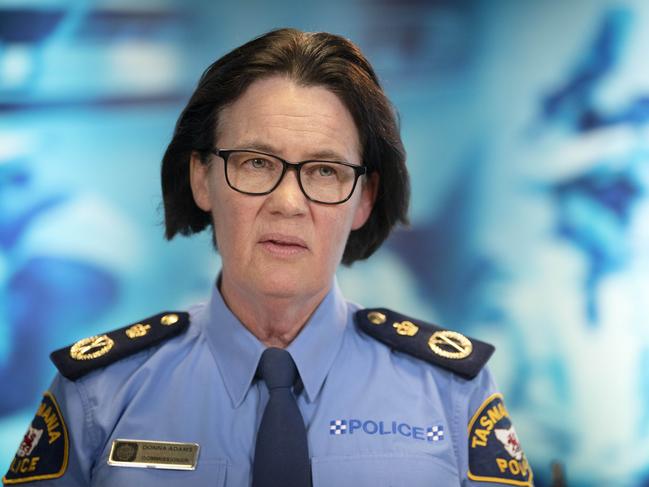Damning review lays bare the truth of pedophile cop and decisions by ‘highest echelons’ of the force
Potentially more than 52 young boys were groomed – and an unknown number sexually abused – by pedophile policeman Paul Reynolds over three decades, an independent reviewer has found.

Police & Courts
Don't miss out on the headlines from Police & Courts. Followed categories will be added to My News.
Potentially more than 52 young boys were groomed – and an unknown number sexually abused – by pedophile policeman Paul Reynolds in his three-decade career.
The damning statistic is just one of many disturbing findings an independent reviewer has made into the disgraced policeman, who took his own life shortly after his home was finally raided amid a flurry of allegations.
On Thursday, the keenly-anticipated review by barrister and former war crimes prosecutor Regina Weiss was published, exposing the slick tactics used by the master manipulator who took up roles at regional football and basketball clubs to gain access to boys.
But the report also condemned some of those at the “highest echelons” of Tasmania Police, who knew who Reynolds really was when they decided to bury him as a hero, with a full police funeral and a guard of honour.
As part of the review, another seven referrals have been made to Tasmania Police, some regarding child sexual abuse allegations against other former police officers.
The “greatest groomer”
Widely seen as a “top dog”, the “funniest guy I have ever met” and loved by “so many”, Reynolds was in fact using his job as a policeman as a facade, to give an impression of decency while in fact he was hunting and abusing kids for decades.
Ms Weiss said Reynolds used sport as a “hunting ground” for victims as far back as the 1980s, hiding his proclivities in “plain sight” by taking up roles in coaching, umpiring and administration.
His victim-survivors, 15 of whom came forward to Ms Weiss, described him variously as the “greatest groomer”, “so charismatic” and a “father figure”, who made them feel “special” and lured them in with humour and banter.

Looking back as adults however, the victim-survivors said they realised they were being groomed, with one man saying he felt he’d been “brainwashed”, and noting he’d often targeted vulnerable teens or boys without father figures.
Reynolds – commonly referred to as “Beau” – was president of the Northern Tasmanian Football Association at the time of his death, with one victim-survivor noting he took up this role to get “unfiltered access” to football change rooms.
Reynolds also took a “special interest” in the Deloraine football club, despite holding no official roles within it, and was said to attend “all the games” – sometimes parking his car nearby, full of boys, and was “always in the changerooms”.
Ms Weiss said he regularly attended sporting games or training in his police uniform, and pretended to be an accredited massage therapist so he could massage boys who were naked, or only wearing their underpants, sometimes sexually abusing them at the same time.
She said as technology advanced over time, so did Reynolds’ use of it as a grooming tool – developing a pattern of grooming by first sending friend requests on Facebook before moving on to friendly conversation, then to sexualised “banter” before outright declarations of love.
At this point, Reynolds would entice the boy to move to Snapchat and send him intimate pictures of themselves in the shower or of their genitals, before moving on to meet in person for sexual contact.

As the boys entered adulthood and moved into their 20s, Reynolds routinely “lost interest”.
But it wasn’t just boys, and their families, that were fooled by Reynolds’ false persona.
He also tricked fellow police officers, who also told Ms Weiss they had long thought he was “larger than life” and “quick-witted”.
“It is evident that Reynolds ingratiated himself so convincingly as an upstanding member of the policing and sporting communities that … some members of the small communities he lived in to this day do not accept or believe that Reynolds had been capable of grooming and sexually abusing children,” she said.
Speaking to members of the media, Ms Weiss said in her 20 years of working in sexual and gender-based violence, including in war zones, she had never seen a groomer as prolific as Reynolds.
She said there was a “high chance” he had more than 52 victims who were “still out there”.
Allegations of corruption
But Ms Weiss’ review also laid to rest concerns from some people that Reynolds may have deliberately interfered with evidence, or tampered with files over a range of Tasmania Police investigations, prosecutions or coronial inquiries over the course of his career – particularly while posted to Western Prosecution Services and while working for the coroner.
Ms Weiss said the review “extensively examined files Reynolds had been associated with”, including specific cases raised by review participants, but found no evidence of deliberate interference.
Despite this, Ms Weiss said it was clear the “lax” and “over-promoted” Reynolds used the perception that he had more power in the force than he actually did, as a grooming mechanism to target his victims.
She said he had bragged to one boy he’d be able to get his dad out of jail on parole.
He showed another boy an apparent police report made against him, which was likely fabricated, but that “if you suck my d… I can make it go away”.
The victim told Ms Weiss he had never been in trouble with the law, and as a terrified boy – with no money for legal costs – had believed Reynolds.
Ms Weiss’ report also found no evidence Reynolds had been sharing explicit pictures of boys with other pedophiles, that he’d been involved in a pedophile ring, or that he’d abused boys at the Ashley Youth Detention Centre.
A betrayal of the force
Ms Weiss said that despite having been first alerted as to pedophilia allegations as far back as 2008, Tasmania Police gave Reynolds a full police funeral upon his death a decade later in 2018 – with hundreds of police officers turning up to pay their respects.
She said at the time of his death, Reynolds was being internally investigated by Tasmania Police Professional Standards – but that the investigation went nowhere once he died.
The investigation did not just include allegations of pedophilia, but was also looking into whether Reynolds had inappropriate contact with criminal entities, and some financial matters, including the unauthorised use of his infirm mother’s money.

After Reynolds died in 2018, the investigation “remained dormant” until Tasmania’s Coronial Division conducted an inquest into the suicide deaths of four police officers in 2022.
Ms Weiss said the investigation into Reynolds’ pedophilia should have been completed in 2018, noting that even a “cursory look” on his phone showed he had been sending explicit photos to a number of teenage boys and soliciting sexual contact.
“This material was in the possession of Tasmania Police when the highest echelons of the organisation determined that Reynolds was to receive a full police funeral including a guard of honour,” she said.
Ms Weiss said although the current Police Commissioner had apologised for that decision, some police officers who had come forward to her during the review had wondered why it took more than five years for that apology to be made.
She said some of these officers felt “deceived and misled”, and described the scandal as a “cover-up” that had been “swept under the carpet”.
“Some became emotional when articulating the betrayal they felt, followed by anger,” Ms Weiss said.
She said they only found out about who Reynolds really was via media reports, and that the force offered no support or follow-up in the wake of these disturbing revelations.
“If I knew the truth I wouldn’t have gone to the funeral,” one police officer told her.
Ms Weiss said she found no evidence that the force had intentionally covered-up Reynolds sexual abuse of teenage boys, but noted there had been a culture of being more concerned about his reputation than the safety of victims.
She also noted Reynolds had been adept at hiding his proclivities from the force, an relied upon camaraderie and “old school” traditions.
Upon his home being searched in 2018, lamented to the police officers conducting the raid that: “this is career destroying” and “what a way to end a 40-year career”.
Ms Weiss said she had observed that Tasmania Police’s culture had since evolved for the better.
A way forward
In releasing the report publicly, Tasmania Police Commissioner Donna Adams has promised the force “can and will do better”.
She commended the bravery and resilience of victim-survivors, both those who had come forward to Ms Weiss, and those who had chosen not to.
“You have been heard and I am focused on rebuilding the trust of both our community and our own people,” Commissioner Adams said.
She said it had been “incredibly distressing” to learn of the full extent of Reynolds’ offending.
“It is challenging and confronting, as it lays bare the failing in our systems to respond to victims, protect the community from harm by him, and our failings as an organisation in relation to our own staff,” she said.
Commissioner Adams said she supported the five key recommendations made by Ms Weiss, including a redress scheme for Reynolds’ victim-survivors and a “restorative engagement framework” for people who had been groomed or abused by Tasmania Police officers.
Ms Weiss also recommended Tasmania Police establish a dedicated victim management team, which operated separately from the Professional Standards unit, and the force focus on community engagement and building trust within sporting organisations for the purposes of preventing sexual abuse.
Lastly, Ms Weiss recommended Tasmania Police ask the government to alter the Integrity Commission Act, to ensure all sexual abuse allegations made against police officers were independently investigated.





